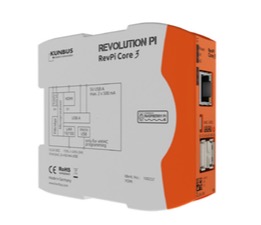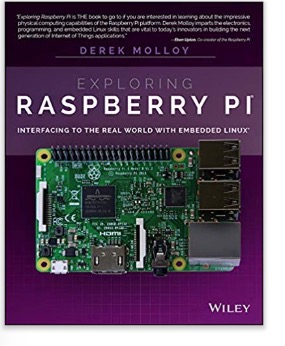Blog
Recent Posts
Industrial Raspberry Pi Meets The EN61131-2 Standard And Supports Analog And Digital I/O
Posted by on
KUNBUS has followed up the RevPi Core by launching the RevPi Core 3. Equipped with the latest Compute Module 3 from Raspberry Pi, it has a 1.2 GHz Quad Core processor with 1 GB RAM and 4GB eMMC flash memory. Thanks to the boost in performance in comparison with its predecessor, the RevPi Core 3 is now ideal for control applications like, for example, image processing.
Consisting of open hardware and software, the industrial PC RevPi Core 3 meets the EN61131-2 standard and, thanks to its modular structure, can be enhanced with digital and analogue I/O modules as well as suitable fieldbus gateways. The hardware therefore fulfils all the prerequisites for a small controller suitable for industrial use. Mounted in a DIN rail housing, the RevPi Core 3 has USB, Ethernet and HDMI ports. The basic and enhanced modules both run on the standard industrial 24-volt power supply.
As its operating system, RevPi Core 3 is equipped with an adapted Raspbian Jessie with a real time patch and a variety of features. Amongst other things, the RevPi Core 3 has Master and Slave capabilities for the two communication protocols Modbus TCP and Modbus RTU.
Users of the predecessor model RevPi Core installed with Raspbian Wheezy have a lot to look forward to: from the start of June, Raspbian Jessie can be downloaded free of charge for RevPi Core users.
- Download/View the KUNBUS RevPi Core Data Sheet (PDF)...
- Revolution Pi Tutorials...
- More Information...
Exploring Raspberry Pi is the innovators guide to bringing Raspberry Pi to life. This book favors engineering principles over a 'recipe' approach to give you the skills you need to design and build your own projects. You'll understand the fundamental principles in a way that transfers to any type of electronics, electronic modules, or external peripherals, using a "learning by doing" approach that caters to both beginners and experts. The book begins with basic Linux and programming skills, and helps you stock your inventory with common parts and supplies. Next, you'll learn how to make parts work together to achieve the goals of your project, no matter what type of components you use. The companion website provides a full repository that structures all of the code and scripts, along with links to video tutorials and supplementary content that takes you deeper into your project.
The Raspberry Pi's most famous feature is its adaptability. It can be used for thousands of electronic applications, and using the Linux OS expands the functionality even more. This book helps you get the most from your Raspberry Pi, but it also gives you the fundamental engineering skills you need to incorporate any electronics into any project.
- Develop the Linux and programming skills you need to build basic applications
- Build your inventory of parts so you can always "make it work"
- Understand interfacing, controlling, and communicating with almost any component
- Explore advanced applications with video, audio, real-world interactions, and more
Be free to adapt and create with Exploring Raspberry Pi.
 Loading... Please wait...
Loading... Please wait...


